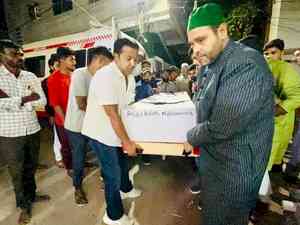Results from an important new global health trial surprise researchers
Author(s): City Air NewsLudhiana, June 29, 2017: Stroke or brain attack is the leading cause of death and disability in the world. After the medical treatment patients need rehabilitation. In India due to lack of therapists (physiotherapists,...


Ludhiana, June 29, 2017: Stroke or brain attack is the leading cause of death and disability in the world. After the medical treatment patients need rehabilitation. In India due to lack of therapists (physiotherapists, speech therapists and occupational therapists) patients do not receive rehabilitation adequately and relatives carry out some rehabilitation at home. However whether this form of rehabilitation is effective or not has not been scientifically studied. Hence family members were trained to carry out rehabilitation at home in the recently concluded ATTEND trial. This is one of the largest stroke rehabilitation trials ever undertaken has revealed family-led rehabilitation is ineffective.
The research published in the prestigious medical journal Lancet this week revealed there was no reduction in disability for patients on the trial, compared to those who received no extra care.
Lead author Professor Richard Lindley, of The George Institute for Global Health and the University of Sydney, said the results were surprising. Professor Lindley said: “We had expected to see a marked improvement in recovery of people who received this extra care delivered by their own trained family members, in their own homes. Other trials have indicated that community-based rehabilitation can play a significant role in recovery.
Professor Jeyaraj D Pandian the lead Investigator from India stated “we found that despite extensive training in hospital and during follow up visits in the home, there was no difference in the degree of recovery or quality of life of people who received this extra treatment.” We are confident that the training sessions were completed correctly, and patients and carers accepted the training. Our results suggest that effective rehabilitation may need to be provided by professionals who have undergone years of training and are specialists in their own field.”
The George Institute researchers along with international and Indian stroke experts followed 1,250 patients from 14 stroke centers over six months in India, where stroke affects much younger working age people than those in high-income countries (an average of about 15 years younger).
Half were provided with access to professionals, such as physiotherapists, who taught the family techniques such as mobility training and communication practice. Each patient was also visited at their home to ensure the rehabilitation was carried out correctly by their carer.
Dr Pandian added “In many parts of the world, people who have a stroke receive little to no medical treatment at all. In India, there are only 35 stroke units across the whole country, and most are in the cities. In response to the rising rates of stroke there needs to be much greater investment in facilities for people affected by stroke.” He further stated that it had been hoped the family led care – also known as task shifting (the training of non-physician healthcare workers to perform tasks traditionally undertaken by physicians) would help address the limited healthcare access for those with stroke in low and middle income countries. Community rehabilitation is also a priority of the World Health Organisation. The disappointing results of the trial provide important new evidence that task shifting a complex intervention such as rehabilitation may not be effective.
Dr Dorcas Gandhi, Dr Cynthia Felix, Dr Shweta Jain and Mr Alim were the National coordinators.
The following centers participated from India: Christian Medical College, Ludhiana, PGIMER, Chandigarh (Dr Dheeraj Khurana); St Stephen’s Hospital, New Delhi (Dr Suresh Babu) , AIIMS, New Delhi (Dr V Padma), Apollo Gleneagles Hospital Kolkata (Dr Jayanta Roy), Guwahati Neurological Research Center, Guwahati (Dr NC Borah), Baptist Hospital, Tezpur (Dr Lydia John), NIMS, Hyderabad (Dr Subash Kaul), Lalitha Superspeciality Hospital, Guntur (Dr P Vijaya), Christian Medical College, Vellore (Dr Sanjith Aaron), Global Hospital, Chennai (Dr Halprashanth), BGS Global Hospitals Bangalore (Dr Madhusudhanan), AIMS, Kochi (Dr V Nambiar), SCTIMST Trivandrum (Dr PN Sylaja).
The ATTEND trial was an international collaboration involving Christian Medical College, Ludhiana (National Coordinating Center); The George Institute for Global Health, Sydney and Hyderabad; Universities of Nottingham, Leeds and Glasgow in the UK; Indian Institute of Public Health, Hyderabad. The project was funded by the National Health and Medical Research Council of Australia.
Stroke Facts
• 17 million people have a stroke each year, nearly 2 million of which will occur in India.
• The incidence is rising in low and middle-income countries (like India and China) due to the reduction in infectious disease, rising living standards and the increase in chronic disease.
• Stroke affects younger people in India, compared to those in high income countries like Australia, the US or UK.

 cityairnews
cityairnews 














